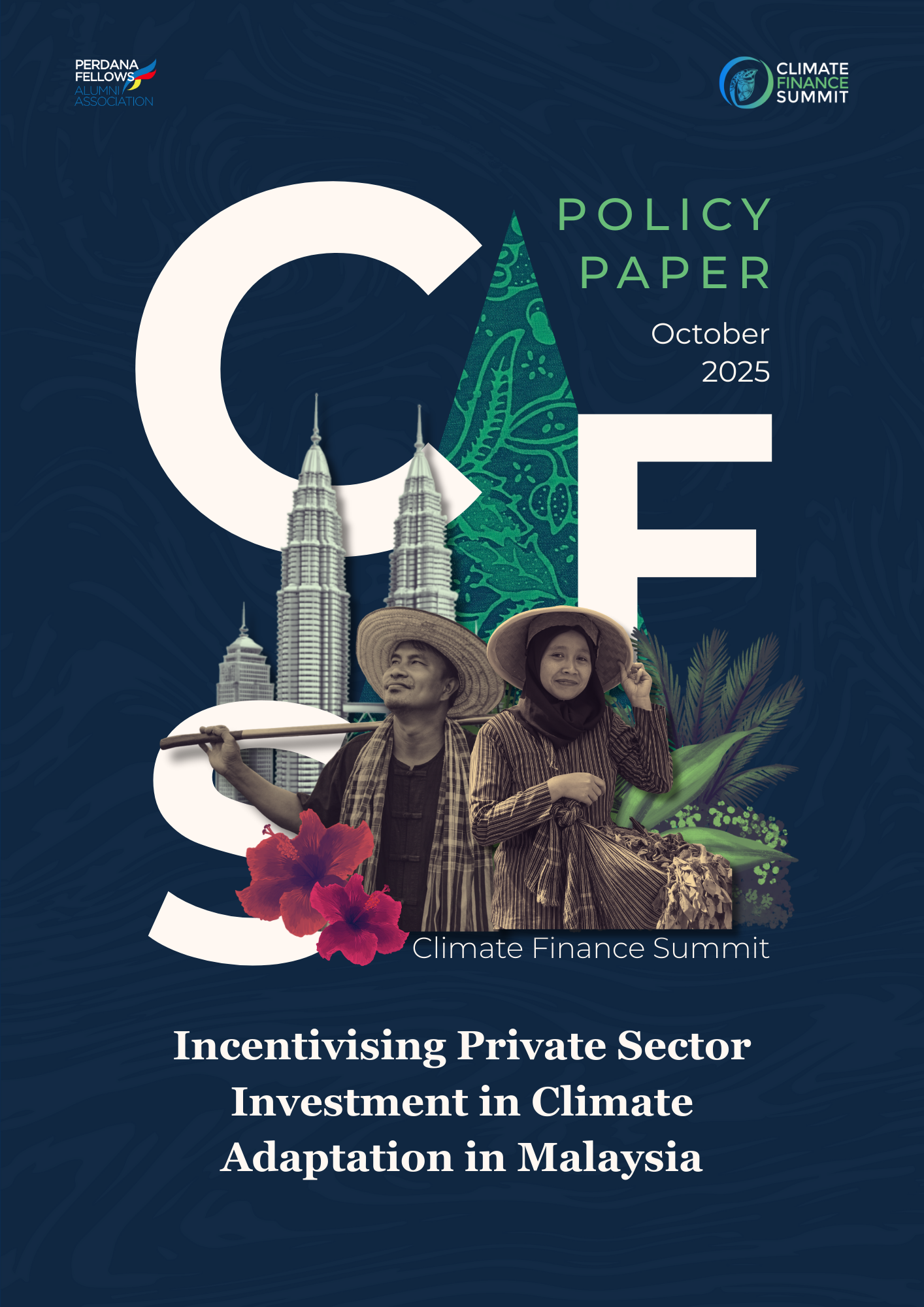
Climate Finance Summit 2025 Policy Paper
The policy paper, “Incentivising Private Sector Investment in Climate Adaptation in Malaysia” is a first-of-its-kind publication under the Climate Finance Summit, offering a forward-looking perspective on scaling up adaptation finance to strengthen national climate resilience.Developed through an expert-informed and youth-led process, it outlines practical strategies for the government to incentivise private sector participation as part of the forthcoming National Adaptation Plan, with the aim to accelerate collective action and close Malaysia’s adaptation financing gap.Financing Climate Resilience for a Green Transition
This Year’s Theme
Strengthening Malaysia’s climate finance ecosystem by scaling capital markets, leveraging green funds and driving sustainable investments
Accelerating
Green Finance
Expanding Climate
Finance Access
Sustainable
Growth

Royal Keynote Address
“Mobilising Climate Finance
for Urgent Action”
His Highness Tengku Amir Shah Ibni Sultan Sharafuddin Idris Shah Alhaj
Raja Muda of Selangor
INSIGHT PANEL 1
Climate finance flows continue to be concentrated in developed economies leaving many emerging markets, including ASEAN nations, struggling to access adequate funding for climate action. While global finance mechanisms evolve, questions remain about whether funds are reaching the right places and driving tangible impact. This session will provide a comprehensive multi-level perspective on climate finance at the global, ASEAN and youth levels.
Global Trends in Climate Finance
SDG Impact Finance Analyst
United Nations Development Programme (UNDP) Malaysia, Singapore and Brunei Darussalam
Ong Pei Yeing
Yin Shao Loong
Deputy Director of Research
Khazanah Research Institute (KRI)
Global Lead of the Carbon Finance
and Markets Taskforce
World Wildlife Fund (WWF)
Reuban Manokara
Moderator
Ahmad Qadri
Financial Services Assurance Leader and Partner
Ernst & Young (EY) Consulting Sdn. Bhd.

INSIGHT PANEL 2
Scaling Up Malaysia’s Green Capital Markets
Capital markets play a crucial role in scaling climate finance, yet limited liquidity, fragmented regulatory frameworks and insufficient investor incentives hinder rapid expansion. While Malaysia is a global leader in green sukuk, it must look into its investment attractiveness, ensure financial transparency and scale innovative financing solutions. This session will explore how Malaysia can strengthen its green capital markets by expanding sustainable financial instruments, attracting institutional investors and enhancing regulatory frameworks to accelerate the country’s transition toward a low-carbon economy.
Amanah Aboobucker
Julian M Hashim
Chief Sustainability Officer
AmBank Group
Chief Regulatory Officer,
Bursa Malaysia
Raja Amir Shah Raja Azwa
Chief Executive Officer (CEO) HSBC Amanah & Chief Sustainability Officer, HSBC Malaysia
Moderator
Datin Seri Sunita Rajakumar
Founder
Climate Governance Malaysia (CGM)

Special Presentation
Shao Liang
International Department
Central Committee of the Communist Party of China
INSIGHT PANEL 3
While capital markets provide investment opportunities requiring financial returns, many climate initiatives require other forms of finance focused on impact rather than direct repayment obligations. Despite the availability of global climate finance mechanisms like the Green Climate Fund (GCF) and the Loss and Damage Fund, Malaysian stakeholders face significant challenges accessing these resources due to administrative hurdles, complex application processes and limited institutional support. This session will explore how Malaysia can better tap into other funding mechanisms, strengthen domestic support structures and create more inclusive funding models for non-profit initiatives, community projects and adaptation efforts.
Accessing Local & Global Funds
Head of Programmes
UN Global Compact Network
Malaysia & Brunei
Tan Zhi Ying
Dr June Rubis
Research Fellow
Macquarie University
Senior Advisor, Think City and
Founder and Managing Director, Future LinQ
Ar. Ahila Ganesan
Moderator
Board Member
Centre for Environment, Technology and Development Malaysia (CETDEM)
Dr Gary Theseira

FIRESIDE CHAT
Rethinking Global Climate Finance:
Ensuring Equity for the Global South
Climate finance has become a global justice issue, as developing economies bear disproportionate climate risks while struggling to access funding. With ASEAN nations, including Malaysia, still grappling with barriers to climate finance, the failure of COP29 to secure stronger commitments from developed economies raises urgent questions: Can emerging economies rely on international climate finance, or must they prioritise self-sufficiency and regional collaboration? This session will explore the responsibilities of developed nations, ASEAN’s role in regional climate finance and financial innovations needed to bridge equity gaps.
Moderator
Ushar Daniele
Broadcast Journalist
Emeritus Professor
of Political Economy,
University Malaya
Charge d’affaires,
Delegation of European Union to Malaysia
Timo Goosmann
Prof. Dr. Edmund Gomez Terrence
INSIGHT PANEL 4
Building a Green Transition Ecosystem
A successful green transition requires more than capital- it needs strong collaboration between industries, clear regulatory direction and
inclusive financing models that prevent marginalised communities from being left behind. This session will explore how Malaysia can build a robust ecosystem by ensuring investments drive measurable impact, fostering collaboration between public and private sectors and creating inclusive financing mechanisms that support industries, communities and long-term sustainability goals.
Senior Investment Specialist (Private Sector and Climate Change)
Asian Development Bank
William Battye
Nelson Samuel
Director of the Green Technology Division Malaysian Investment Development Authority (MIDA)
Nasha Lee
Climate and Environment Specialist
UNICEF Malaysia
Moderator
Luqman Hariz
Lead Anchor and News Presenter
Astro AWANI

Closing Keynote Speech
“Malaysia’s Energy Transition & Climate Finance Roadmap”
YAB Datuk Seri Fadillah Yusof
Deputy Prime Minister and Minister
of Energy Transition & Water Transformation
Gold Partner
Silver Partner
Strategic Content Partner
Strategic Partners
Strategic Youth Partner
Strategic Media Partner
Supported by
*
The Snapshot
*
CFS Official Newsletter
* The Snapshot * CFS Official Newsletter
Ready to unpack the true cost of inaction
and the transformative power
of climate finance?
The clock is ticking on climate change, and for Malaysia and ASEAN, the cost of
inaction is staggering. Our recent newsletter series has delved into the critical issues and groundbreaking solutions discussed at the Climate Finance Summit.








































